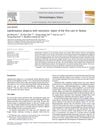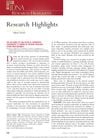 5 citations,
October 2018 in “Medical Science Monitor”
5 citations,
October 2018 in “Medical Science Monitor” Women with PCOS have lower amylin levels, which are not related to their body weight.
 5 citations,
January 2014 in “Postepy Dermatologii I Alergologii”
5 citations,
January 2014 in “Postepy Dermatologii I Alergologii” Hormonal treatments like birth control pills can improve acne in women with excess hair growth and hormone imbalances.
 4 citations,
April 2012 in “Our Dermatology Online”
4 citations,
April 2012 in “Our Dermatology Online” The conclusion is that PCOS is a common cause of hirsutism in young obese women, and early treatment is important to reduce the risk of metabolic syndrome.
 3 citations,
July 2019 in “Case Reports in Obstetrics and Gynecology”
3 citations,
July 2019 in “Case Reports in Obstetrics and Gynecology” A young woman's rare ovarian tumor was successfully removed, improving her hormonal symptoms.
 3 citations,
April 2019 in “Hormone and Metabolic Research”
3 citations,
April 2019 in “Hormone and Metabolic Research” Women with PCOS have lower adiponectin hormone levels and are more likely to have insulin resistance.
 3 citations,
January 1992 in “Gynecological Endocrinology”
3 citations,
January 1992 in “Gynecological Endocrinology” 3α, 17β-androstanediol-glucuronide is not a useful marker for androgen excess but may help monitor certain treatments.
 2 citations,
December 2019 in “Neurobiology of Stress”
2 citations,
December 2019 in “Neurobiology of Stress” Changing allopregnanolone levels in baby rats affects their adult behavior and alcohol use.
 2 citations,
August 2019 in “International Journal of Applied Pharmaceutics”
2 citations,
August 2019 in “International Journal of Applied Pharmaceutics” Niosomes can effectively deliver Superoxide Dismutase to hair follicles, potentially helping prevent hair loss.
 2 citations,
July 2019 in “Journal of psychology & clinical psychiatry”
2 citations,
July 2019 in “Journal of psychology & clinical psychiatry” Zinc helps reduce the severity of depression.
 2 citations,
November 2015 in “Actas Dermo-Sifiliográficas”
2 citations,
November 2015 in “Actas Dermo-Sifiliográficas” The document suggests a possible link between mast cells and scarring alopecia, recommending more research for potential treatments.
 2 citations,
October 2015 in “The New England Journal of Medicine”
2 citations,
October 2015 in “The New England Journal of Medicine” The woman's surgery lowered her testosterone and improved scalp hair loss but did not change her excessive body hair.
 2 citations,
March 2011 in “Dermatologica Sinica”
2 citations,
March 2011 in “Dermatologica Sinica” Taiwan reported its first case of a rare scalp condition with no clear cause or treatment.
 1 citations,
February 2016 in “European Journal of Obstetrics & Gynecology and Reproductive Biology”
1 citations,
February 2016 in “European Journal of Obstetrics & Gynecology and Reproductive Biology” An 84-year-old woman's hair loss was due to a rare condition called Leydig cell hyperplasia, which was treated with surgery.
 1 citations,
November 2011 in “Open access journal of contraception”
1 citations,
November 2011 in “Open access journal of contraception” Birth control pills with low-dose estrogen and antiandrogenic progestins can effectively treat acne.
 1 citations,
March 2011 in “Informa Healthcare eBooks”
1 citations,
March 2011 in “Informa Healthcare eBooks” Hormonal therapy is effective for treating acne in adult women, especially with signs of high androgen levels.
 1 citations,
January 2008 in “Actas Dermo-Sifiliográficas”
1 citations,
January 2008 in “Actas Dermo-Sifiliográficas” Treat hair loss in postmenopausal women with diet, avoiding certain drugs, and using medications like minoxidil or finasteride.
 1 citations,
December 1997 in “Journal of The European Academy of Dermatology and Venereology”
1 citations,
December 1997 in “Journal of The European Academy of Dermatology and Venereology” All women with significant unwanted hair growth have hormonal imbalances, often from polycystic ovary syndrome.
 1 citations,
November 1996 in “Journal of Cutaneous Medicine and Surgery”
1 citations,
November 1996 in “Journal of Cutaneous Medicine and Surgery” Hormones, especially androgens, play a key role in causing acne, and treatments like hormone control pills and hormone-blocking medications can help.
 October 2024 in “Journal of the Endocrine Society”
October 2024 in “Journal of the Endocrine Society” Leydig cell tumors can cause high testosterone and symptoms like hair loss in postmenopausal women, but surgery can improve these symptoms.
 February 2024 in “Oriental Journal of Chemistry/Oriental journal of chemistry”
February 2024 in “Oriental Journal of Chemistry/Oriental journal of chemistry” Eclipta alba shows promise for treating various health issues and needs more research.

Isotretinoin may cause temporary, reversible facial hair growth in some women.

Human hair keratins can be turned into useful 3D biomedical scaffolds through a freeze-thaw process.
 April 2020 in “Journal of the Endocrine Society”
April 2020 in “Journal of the Endocrine Society” A woman's high testosterone and related symptoms were caused by overactive cells in her ovaries.
 September 2018 in “Facial Plastic Surgery Clinics of North America”
September 2018 in “Facial Plastic Surgery Clinics of North America” Biologicals are increasingly used in medicine and cosmetics, especially for skin and hair treatments, but more research is needed.
 July 2018 in “International journal of clinical & experimental dermatology”
July 2018 in “International journal of clinical & experimental dermatology” Eat a balanced diet for healthy hair; only use supplements if you have a proven nutrient deficiency.
 December 2016 in “Springer eBooks”
December 2016 in “Springer eBooks” Chrousos Syndrome is caused by mutations that make the body less sensitive to glucocorticoids, leading to various symptoms and requiring high-dose treatment.
 July 2015 in “Cambridge University Press eBooks”
July 2015 in “Cambridge University Press eBooks” Androgens like testosterone affect skin health and can lead to conditions such as acne and hair loss, with various treatments available.
 November 2014 in “John Wiley & Sons, Ltd eBooks”
November 2014 in “John Wiley & Sons, Ltd eBooks” Eating high-glycemic and dairy foods can increase hormones that may cause acne and other health issues.
 October 2011 in “Iranian Journal of Dermatology”
October 2011 in “Iranian Journal of Dermatology” Men with male pattern baldness may have a higher risk of heart disease due to increased levels of a specific lipid in their blood.
 July 2011 in “Journal of the Dermatology Nurses’ Association”
July 2011 in “Journal of the Dermatology Nurses’ Association” Antibiotic ointment and petrolatum ointment heal wounds similarly; iron deficiency isn't linked to certain hair loss in women; griseofulvin and terbinafine are equally effective for fungal scalp infections but work better on different types.






























